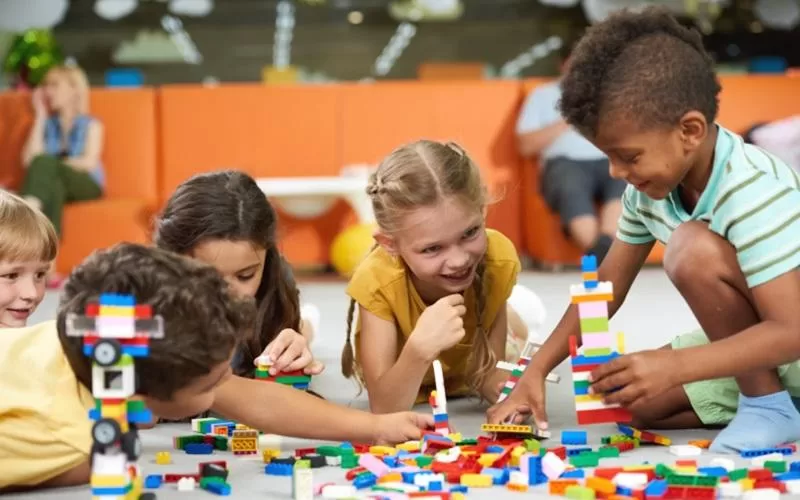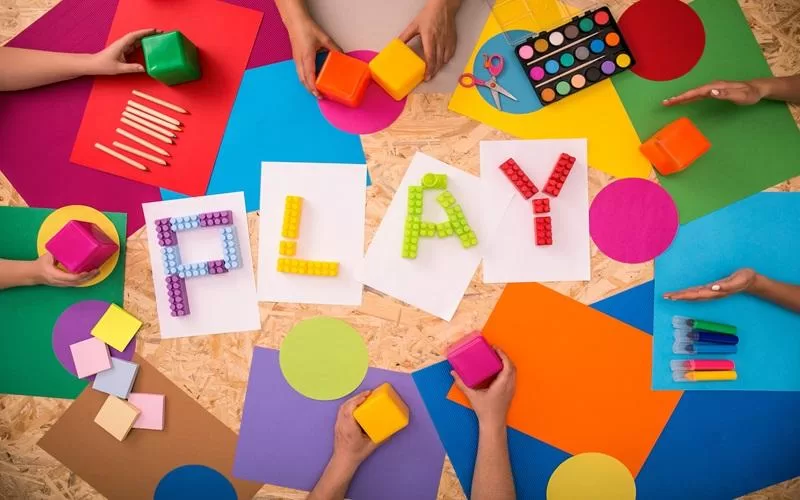
Imagine a world where building a cardboard castle transforms into a lesson in collaboration, where giggles during tag evolve into understanding empathy, and where make-believe tea parties become masterclasses in communication. This is the magical world of play for young children, where the seemingly frivolous transforms into a powerful tool for building essential social skills. But how, exactly, does this playful alchemy occur? The following points will touch on the fascinating science behind why playtime isn’t just fun – it’s a social development superpower! Read on to learn more.
From Pretend Playgrounds To Social Proficiency
Think of pretend play as a social gym for the developing mind. As little ones don doctor coats, wield plastic swords, or brew imaginary tea, they’re not just having fun; they’re practicing crucial social skills like.
The Art Of Communication
From inventing fantastical narratives to negotiating roles and expressing emotions, pretend play demands effective communication. Whether it’s crafting dramatic pronouncements as a doctor or sharing imaginary cookies at a tea party, their language skills flourish in this free-flowing world.
Empowering Empathy
Stepping into different shoes – literally and figuratively – allows children to see the world through another person’s eyes. When they become the brave knight rescuing the damsel in distress, or the kind doctor comforting a teddy bear patient, they’re fostering understanding and compassion, seeds of empathy that blossom in real-life interactions.
Collaboration Makes The Dream Work
Building elaborate forts, planning grand adventures, and sharing cherished toys all require cooperation – hence, children are encourage to interact with their peers. These playful collaborations lay the groundwork for future teamwork, teaching them the power of ‘we’ over ‘me’ and the value of working together towards a common goal.
Encourage Outdoor Play
The natural environment offers opportunities for diverse play experiences and social interactions. Imagine transforming your backyard into a kid’s paradise! Set up a scavenger hunt or an obstacle course for endless fun. Create a nature trail winding through your garden, or if you have a cornfield, turn it into an amazing maze. It’s a fantastic way to keep the kids active and working together. Looking for ideas? Click here to discover how to make your corn maze an exciting and educational adventure
for your little explorers!
Problem-solving Champions
Navigating imaginary conflicts between superheroes and villains, overcoming pretend obstacles in their cardboard kingdoms, and figuring out how to share resources amidst a fantastical pirate raid – these playful challenges hone problem-solving skills that seamlessly translate to real-life situations. They learn to think critically, strategize, and negotiate solutions, building a mental toolkit for future social encounters.

Beyond Make-Believe: The Social Symphony Of Fun Games And Activities
While pretend play holds immense power, social learning doesn’t stop there. Games, from simple board games to elaborate group activities, provide additional platforms for social development:
Turn-taking Takes Center Stage
Even the simplest of games, like peek-a-boo or passing a ball, introduce the valuable concept of waiting and respecting others’ turns. As they giggle and anticipate their turn, they’re laying the foundation for respectful social interactions.
Rules Become Building Blocks
Whether it’s mastering hopscotch squares or following card game instructions, adhering to rules in games introduces the concept of social norms and fosters self-control. They learn to navigate boundaries, understand consequences, and adjust their behavior accordingly, skills that translate into navigating the social landscape.
Healthy Competition Breeds Camaraderie
Learning to win and lose gracefully, celebrating others’ gaming achievements with genuine cheers, and offering encouragement to their fellow players are all valuable social lessons learned through playful competition. They discover the joy of shared experiences, the importance of sportsmanship, and the power of positive interaction.
The Science Behind The Smiles
But how does one know this playful magic is more than just fun and games? Research paints a clear picture: studies have shown that children who engage in regular play tend to exhibit better social skills, including:
- Stronger Communication Skills – They express themselves more clearly, listen attentively, and engage in more complex conversations.
- Enhanced Empathy – They show a greater understanding of others’ feelings and are more likely to help those in need.
- Improved Conflict Resolution – They handle disagreements constructively and find solutions that work for everyone involved.
- Increased Self-confidence – They feel more comfortable interacting with others and are more likely to participate in social activities.
So, the next time you see your child engrossed in play, remember that it’s not just a carefree moment; it’s a vital investment in their social and emotional development. Encourage imaginative play, embrace collaborative games, and witness the magic of how fun fuels social butterflies!
Additional Tips For Playful Learning
Check out the following tips to ensure learning is achieved while your kiddos are at play
- Provide a variety of play materials – Blocks, dolls, dress-up clothes, and art supplies can spark endless possibilities.
- Get involved in the play –Join your child in their imaginary worlds, add your own ideas, and model positive social interactions.
- Encourage outdoor play – The natural environment offers opportunities for diverse play experiences and social interactions.
- Limit screen time – Excessive screen time can hinder social development, so prioritize interactive play instead.
To Conclude
Remember, play is a process, not a product: Don’t pressure your child to achieve specific outcomes. Focus on the fun and the joy of the experience. By understanding the power of play and nurturing a playful environment, parents, school administrators, teachers, child caretakers, and many more can unlock the potential within every child to become confident, empathetic, and socially adept individuals.
Leave a Reply